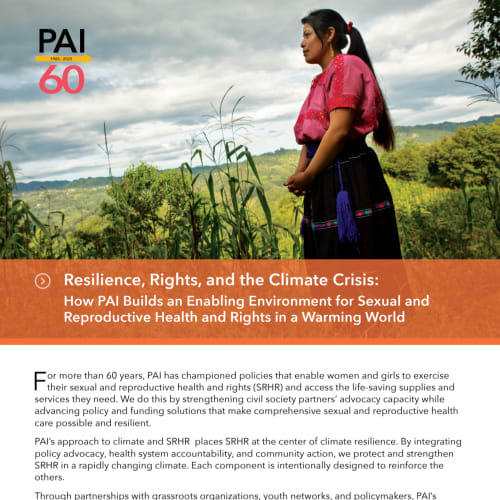Resilience, Rights, and the Climate Crisis: How PAI Builds an Enabling Environment for Sexual and Reproductive Health and Rights in a Warming World

Family planning is one of the most effective development interventions, improving the health and well-being of women and girls, increasing their social mobility and earning potential by helping them stay in school, and contributing to numerous other benefits for communities. These positive community impacts include reducing maternal mortality, increasing child survival and even building resilience in the face of external shocks such as food insecurity and climate change. In fact, access to comprehensive, high-quality sexual and reproductive health (SRH) services and supplies is critical to achieving Sustainable Development Goals (SDGs) one through five, as well as goals eight, 10 and 11—just to name a few.
Yet, in most low-income countries, family planning is donor-dependent and heavily subsidized by users themselves. However, donor funding is insufficient and stagnant. At the same time, many low-income countries are graduating to middle-income status and losing eligibility for donor funds. As a result, public financing is necessary to ensure sustainability of sexual and reproductive health and rights (SRHR) investments.
In response, many SRH advocates have focused on domestic resource mobilization (DRM) from the perspective of creating budget lines and tracking associated allocations and expenditures at the national and subnational levels. Fewer have been engaged in DRM with respect to health financing strategies under the umbrella of achieving universal health coverage (UHC). Not only are the principles behind these strategies consistent with the achievement of SRHR, they represent the next best opportunity to shore up funding for SRH in the current funding and political environment.
A large part of UHC will involve establishing or reforming countries’ insurance schemes. These discussions will dictate whether insurance systems are pro-poor, include SRH services in benefits packages, or pay for certain or all portions of services. To ensure financial sustainability and equitable access, insurance schemes and respective packages of services must include SRH information and services—including family planning, safe abortion and post-abortion care, pregnancy-related services and STI prevention and treatment—and now is the time to advocate for their inclusion. This environment represents an opportunity for SRHR priorities that champions of SRH cannot afford to miss.
Stay informed about the issues impacting sexual and reproductive health and rights.